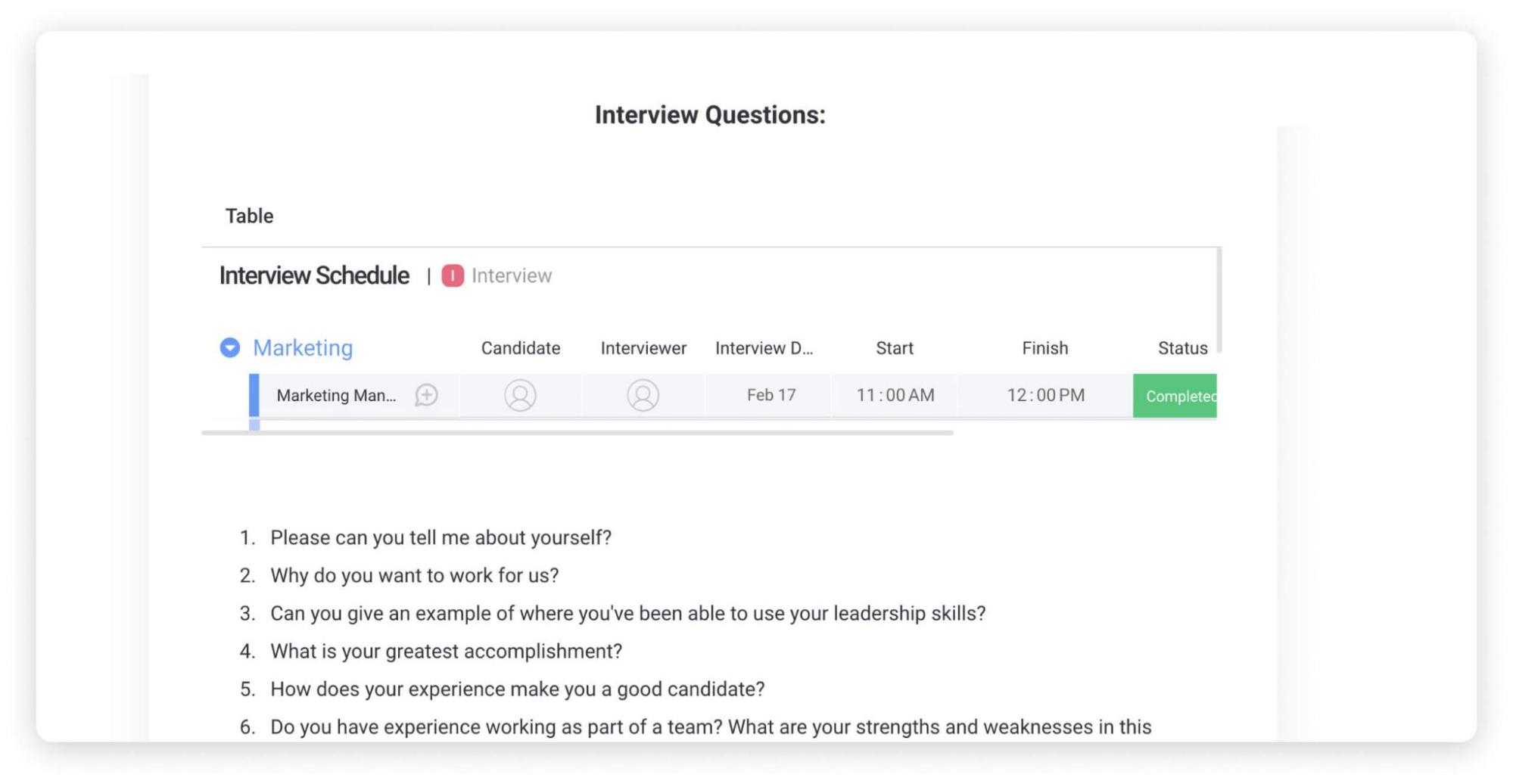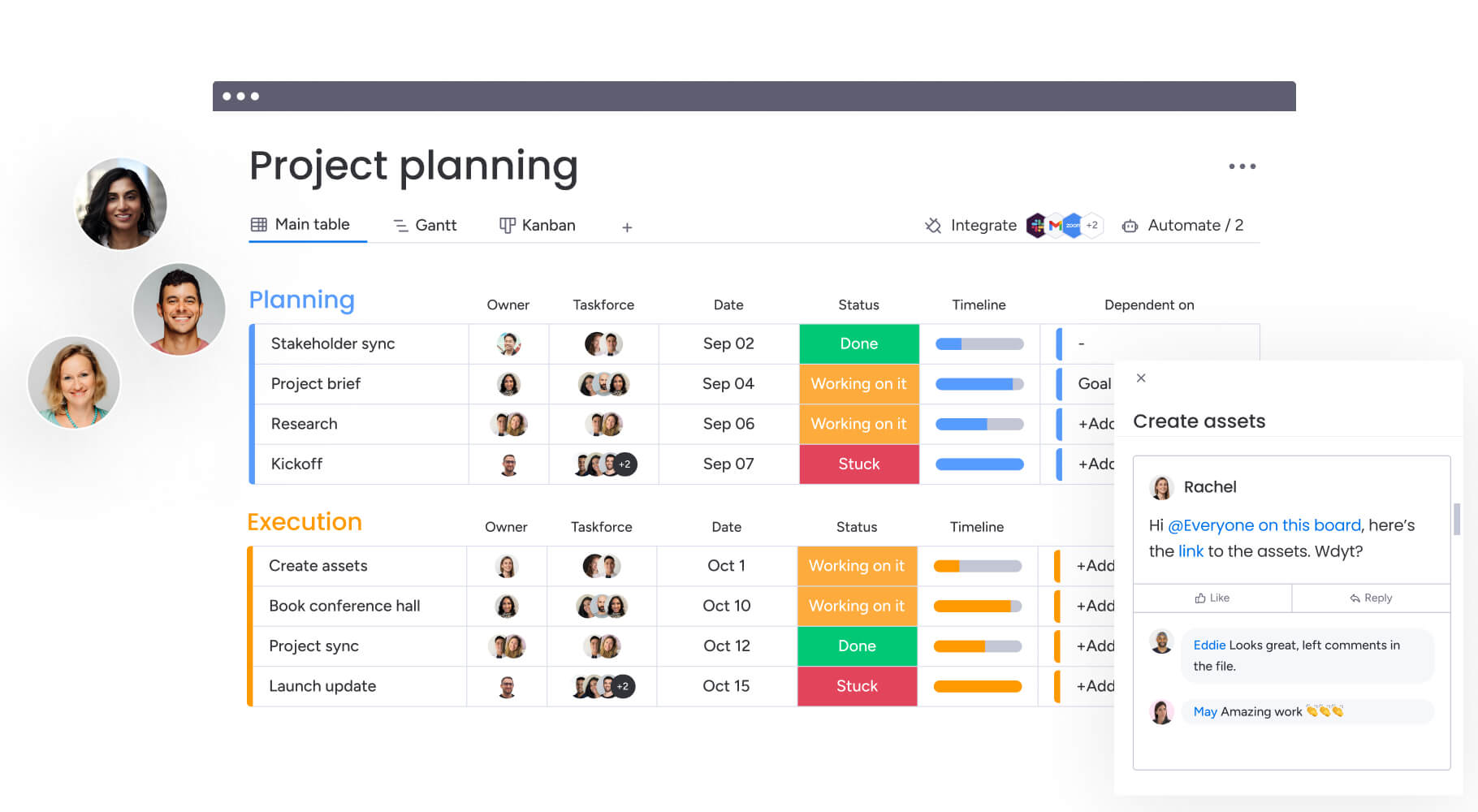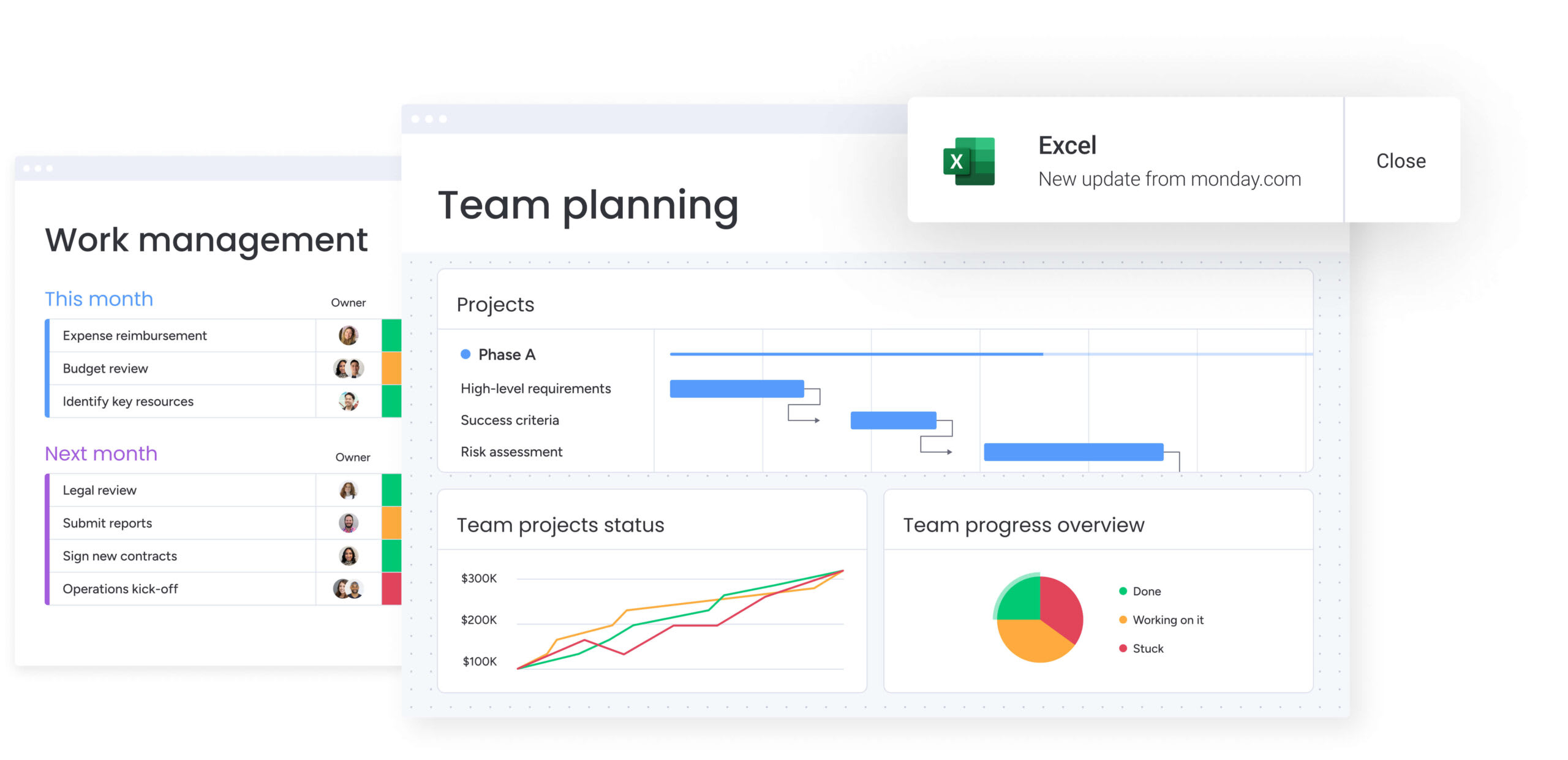Preparing for a project manager interview can feel like managing a project of its own — multiple moving parts, tight timelines, and high expectations. The good news? Like any successful project, the key is preparation and strategy.
This guide covers the most common project manager interview questions you can expect in 2026 and how to answer them with confidence. You’ll learn how to highlight your leadership, communication, and problem-solving skills — and how to show interviewers that you can guide teams, manage stakeholders, and deliver results.
We’ve also included expert insights from project leaders and proven answer frameworks you can adapt to your own experience. By the end, you’ll have a practical game plan for every question that comes your way — from technical PM scenarios to culture-fit conversations.
Let’s land you that new job!
Key takeaways
-
Prepare strategically: focus on the skills and examples that prove your ability to lead, plan, and deliver successful projects.
-
Practice storytelling: use real examples that show how you solve problems, manage teams, and adapt under pressure.
-
Research your company: tailor your answers to match the organization’s goals, values, and preferred project management approach.
-
Show leadership under pressure: demonstrate emotional intelligence and confidence when discussing challenges or setbacks.
-
Level up your project management skills with monday work management: plan, track, and optimize every project from one connected workspace to build the habits of a top-performing project manager.
What interviewers really look for in a project manager
To succeed in a project manager interview, it helps to think like your interviewers. What do they value most? What signals tell them you’ll lead effectively and deliver results? Understanding the skills that make a great project manager is the first step to standing out.
We asked our own Project Manager Team Lead, Kim Landau, what she looks for when hiring project managers for the monday team. Here’s what she shared:
That mindset — balancing confidence with collaboration — is key to becoming a strong project manager. Interviewers also want to see proof that you’ve built a solid foundation of technical and interpersonal skills.
In his Harvard Business Review Project Management Handbook, Antonio Nieto-Rodriguez highlights several traits that top-performing project managers share:
-
Strong technical understanding: familiarity with frameworks like Waterfall, Agile, Scrum, Lean, or PRINCE2.
-
End-to-end project ownership: ability to initiate, plan, execute, and monitor projects successfully.
-
Emotional intelligence: empathy and awareness to build trust and navigate team dynamics.
-
Analytical thinking: capacity to identify root causes and solve problems under pressure.
-
Decisive leadership: confidence to make informed decisions and guide others through ambiguity.
-
Influence and communication: skill in inspiring teams, aligning stakeholders, and persuading effectively.
In short, hiring managers are looking for more than certifications or checklists — they want project leaders who can combine process with people skills, stay adaptable, and consistently deliver results.

How to answer any behavioral question: the STAR method
Behavioral questions are some of the toughest parts of a project manager interview. They usually start with phrases like “Tell me about a time when…” or “Give an example of how you handled…” and are designed to see how you think, communicate, and act under pressure.
A proven framework for answering these questions clearly and confidently is the STAR method. It helps you structure your stories so they’re easy for interviewers to follow and focused on measurable results.
Here’s how it works:
-
Situation: describe the background or context so the interviewer understands what was at stake.
-
Task: explain your specific responsibility or objective in that situation.
-
Action: outline the concrete steps you took to address the challenge or reach the goal.
-
Result: share the outcome — ideally with data or lessons learned that show your impact.
Example:
“In my last role, our client requested a mid-project scope change that risked delaying delivery. I met with the team to re-prioritize tasks, communicated the revised timeline to stakeholders, and set up a daily check-in to monitor progress. As a result, we delivered the project two days ahead of the new schedule and improved client satisfaction scores by 15%.”
Practicing your stories using the STAR framework ensures you stay focused, demonstrate accountability, and make every example memorable. It’s one of the simplest ways to show you have both the technical and people skills that make a great project manager.
Behavioral and situational interview questions
Now that you know how to structure your answers using the STAR method, it’s time to put it into practice. Most project manager interviews include behavioral and situational questions designed to reveal how you lead teams, solve problems, and adapt to challenges.
These questions don’t just test your technical expertise — they show how you apply your skills in real-world situations. Interviewers want to understand your decision-making process, your ability to stay calm under pressure, and how you collaborate with others to get results.
Here are some of the most common examples to help you prepare and tailor your own stories:
1. Tell me about yourself
How to answer: This is your chance to deliver a concise elevator pitch. Connect your experience directly to the job description. Highlight 1-2 key achievements and explain why you are interested in this specific role and company.
Example: “I’m a project manager with over five years of experience, specializing in marketing campaigns for tech companies. In my last role at [Previous Company], I led a team of six to launch a major product rebranding, which we delivered on time and 10% under budget. I was responsible for everything from initial planning in our monday.com workspace to stakeholder communication. I’m passionate about using clear processes to drive creative results, which is why I was so excited to see this opportunity at [Company Name].”
2. Tell me about your most challenging project
How to answer: Use the STAR method. Focus on a project with a real challenge that you successfully navigated. Emphasize your problem-solving skills, resilience, and what you learned from the experience.
Example: “My most challenging project was a website migration with a very tight deadline. My task was to coordinate between our internal development team, a third-party design agency, and the client’s marketing department, none of whom had worked together before. To get everyone aligned, I created a centralized project board on monday.com with clear timelines, dependencies, and a communication plan. I used automations to notify stakeholders of status changes, which kept everyone in the loop without constant meetings. As a result, we successfully launched the new site on schedule with zero downtime, and the client was thrilled with the transparent process.”
3. How do you handle a project that’s falling behind schedule?
How to answer: Show that you are proactive, not reactive. Talk about how you identify risks early, communicate clearly, and work collaboratively to find solutions.
Example: “When I see a project is at risk of falling behind, my first step is to identify the root cause using our project tracking dashboard. Is it a resource issue, scope creep, or an unexpected bottleneck? Once I understand the problem, I communicate transparently with the stakeholders to manage expectations. We then work as a team to re-prioritize tasks, adjust the timeline on our Gantt chart, or allocate additional resources using the Workload view on monday.com to see who has capacity. The key is to address it head-on rather than hoping it resolves itself.”
4. Describe a time you dealt with a difficult stakeholder
How to answer: This question tests your communication and relationship-building skills. Focus on empathy, active listening, and finding a mutually agreeable solution.
Example: “I once had a key stakeholder who was consistently providing negative feedback and requesting changes late in the process. I scheduled a one-on-one meeting to understand their concerns. It turned out they felt disconnected from the project’s progress. To solve this, I created a custom, high-level dashboard for them on monday.com that provided real-time updates on the metrics they cared about most. This increased their sense of involvement and trust, and they became one of the project’s biggest advocates.”
5. How do you handle scope creep?
How to answer: Demonstrate that you have a clear process for managing changes. This shows you can protect your team and the project’s integrity while still being flexible.
Example: “I establish a clear project scope upfront using a monday.com Workdoc and get stakeholder sign-off. Any new requests must be submitted through a monday.com form, which automatically populates a change request board. This allows us to assess the impact on the timeline and budget using real-time dashboards before making a decision. This process ensures transparency for everyone involved and prevents uncontrolled scope creep.”
Technical and project management methodology questions
While behavioral questions reveal how you work, technical and methodology-based questions focus on what you know. These give interviewers insight into your understanding of project management frameworks and how you apply them to plan, prioritize, and deliver results.
Expect questions about how you use tools, structure workflows, and adapt different methodologies — such as Agile, Scrum, Waterfall, or Lean — to meet project goals. Hiring managers want to see that you can choose the right approach for the challenge at hand and explain your reasoning clearly.
Use these questions to highlight your technical fluency and strategic mindset — the traits that separate a good project coordinator from a great project manager.
1. What project management methodologies are you familiar with?
How to answer: Name the methodologies you have experience with (e.g., Agile, Scrum, Waterfall, Kanban) and briefly explain how you’ve applied them. Tailor your answer to the company’s preferred approach if you know it.
Example: “I have extensive experience with Agile and Scrum, which I’ve used for software development projects to manage sprints and adapt to changing requirements. I’m also proficient in Waterfall for projects with fixed scopes and deliverables, like event planning. I believe in a hybrid approach, using a platform like monday.com to customize workflows that borrow the best elements from each methodology depending on the project’s needs.”
2. What project management software are you proficient in?
How to answer: Be honest about your experience. Mention specific platforms and highlight your proficiency with key features that demonstrate your skills.
Example: “I’m highly proficient with monday.com, where I’ve built complex workflows, custom automations, and executive-level dashboards from scratch. I’m particularly skilled with features like the Workload widget for resource management and Gantt charts for long-term planning. I’m also familiar with Jira and Asana.”
3. How do you manage and track a project budget?
How to answer: Describe your process for budget planning, tracking, and reporting. Show that you are detail-oriented and financially responsible.
Example: “I start by creating a detailed budget plan at the beginning of a project, breaking down costs by phase and task. I track all expenses in real-time on a dedicated board on monday.com, using formula columns to automatically calculate burn rate and variance. This allows me to generate weekly budget reports for stakeholders and flag any potential overages before they become a problem.”
4. How do you prioritize tasks?
How to answer: Explain a specific prioritization framework you use, such as the Eisenhower Matrix (Urgent/Important) or value vs. effort. This shows you have a systematic approach.
Example: “I use a value vs. effort matrix to prioritize tasks. On our project board, each task is assigned a score for its potential impact (value) and the resources required (effort). This helps the team focus on high-impact activities first. We use custom automations on monday.com to automatically flag tasks that are high-value and low-effort as top priorities for the week.”
5. What is your approach to risk management?
How to answer: Outline your process for identifying, assessing, and mitigating risks. This demonstrates foresight and strategic thinking.
Example: “My approach to risk management is proactive. At the start of any project, I hold a brainstorming session with the team to identify potential risks. We log these in a Risk Register on monday.com, assigning each a probability and impact score. For high-priority risks, we develop a mitigation plan and assign an owner. We review the register weekly to ensure we stay ahead of any potential issues.”

Leadership and team management questions
Great project managers don’t just manage timelines — they lead people. These leadership and team management interview questions are designed to uncover how you motivate teams, resolve conflicts, and communicate under pressure.
Interviewers want to understand your leadership style: how you bring out the best in individuals, keep projects on track, and create alignment across diverse stakeholders. They’re also looking for emotional intelligence — the ability to listen, empathize, and guide teams through challenges with confidence.
When answering, focus on moments that show how you’ve built trust, inspired collaboration, and turned setbacks into learning opportunities.
1. What is your leadership style?
How to answer: Describe your leadership style with a real-world example. Words like “collaborative,” “servant,” or “transformational” are good, but you need to show what they mean in practice.
Example: “I would describe my leadership style as collaborative and empowering. I believe the best ideas come from the team, so I focus on creating an environment where everyone feels comfortable sharing their input. For instance, on my last project, I used a monday.com board to collect anonymous feedback on our processes. This led to a brilliant suggestion that cut our reporting time in half. I see my role as removing obstacles and giving the team the tools and autonomy they need to do their best work.”
2. How do you motivate an underperforming team member?
How to answer: Show empathy and a focus on solutions. Your goal is to understand the root cause of the issue and provide support, not to place blame.
Example: “If a team member is underperforming, I first schedule a private conversation to understand what’s going on. I want to know if the issue is a lack of clarity, a skills gap, or a personal challenge. Once I understand the root cause, we can create a performance improvement plan together, with clear, achievable goals tracked on a private board. I find that showing support and providing a clear path forward is often the most effective way to motivate someone.”
3. How do you handle conflict within a team?
How to answer: Demonstrate your ability to mediate and facilitate a constructive resolution. Focus on open communication and finding common ground.
Example: “When conflict arises, I address it directly and privately. I bring the involved parties together to facilitate a conversation where each person can share their perspective without interruption. My goal is to help them find common ground and agree on a path forward that aligns with the project’s objectives. I document the resolution to ensure accountability and follow up to make sure the relationship is repaired.”
4. How do you ensure effective communication on your projects?
How to answer: Describe your communication strategy, including the tools and processes you use to keep everyone informed.
Example: “I believe in creating a single source of truth for all project information. We use monday.com as our central hub, which eliminates confusion from scattered emails and chats. I establish a clear communication plan at the start, outlining when we’ll have meetings, how we’ll provide status updates, and how stakeholders can ask questions. Using automations for status updates and dashboards for high-level progress ensures everyone has the information they need without creating unnecessary noise.”
5. What role does AI play in project management, and how do you see it evolving?
How to answer: Show that you are forward-thinking and understand industry trends. Connect AI to practical benefits like efficiency and data analysis.
Example: “I see AI as a powerful assistant for project managers. It’s already automating repetitive tasks, which frees up time for strategic work. For example, on monday.com, we use AI to summarize long documents, generate task lists from meeting notes, and even draft stakeholder emails. In the future, I expect AI to become even more predictive, helping us identify potential risks and optimize resource allocation before we would spot them manually. It’s about augmenting our abilities, not replacing them.”
Top questions to ask your interviewer in a project manager interview
Interviews are a two-way conversation. Asking smart, well-timed questions shows that you think strategically and care about finding the right fit — not just landing any role. The best project managers use this part of the interview to learn about company culture, team dynamics, and how success is measured.
When preparing, think about what you truly need to know to thrive in the position. These questions to ask your interviewer can help you stand out and leave a lasting impression:
-
How is project success measured here: learn what metrics or outcomes matter most to the organization so you can align your approach.
-
What project management tools or platforms does the team use: demonstrate curiosity about the company’s tech stack and how it supports collaboration.
-
How does the team handle changing priorities or shifting deadlines: show that you understand the realities of project work and value adaptability.
-
What qualities make someone successful in this role: uncover the soft skills and leadership traits the company values most.
-
How do teams collaborate across departments: highlight your interest in communication and cross-functional coordination, key to every strong project manager.
Use your interviewer’s answers to frame your own closing remarks — connect their priorities back to your experience, and you’ll finish the conversation with confidence and clarity.

Become a better project manager with monday work management
Behind every great project manager is a system that keeps work flowing smoothly. The right platform should give you visibility into every moving piece, clarity around ownership, and the flexibility to adapt when priorities shift — and that’s exactly what you get with monday work management.
Built for teams of every size and industry, the platform helps you bring order to complexity and lead with confidence from planning to delivery.
Here’s how it helps you manage every stage of your projects more effectively:
-
Plan and visualize with ease: map timelines, dependencies, and milestones in flexible Gantt and Timeline Views that give you a clear picture of progress.
-
Keep your team aligned: centralize communication, files, and updates so everyone knows what’s happening and what’s next.
-
Automate the busywork: eliminate repetitive tasks with no-code automations for assignments, reminders, and status changes.
-
Make smarter decisions faster: track KPIs, workloads, and budgets in customizable dashboards to stay ahead of potential risks.
-
Adapt to any workflow: use templates and flexible boards that fit Agile, Scrum, or Waterfall methodologies — or design your own hybrid approach.
With one connected workspace that scales to your needs, you can focus on leading people, not chasing updates.
Take control of your projects and elevate your impact as a project manager today.
FAQs
What are the three most critical skills for a project manager?
The three most critical skills are: 1. Communication: The ability to clearly articulate goals, updates, and feedback to team members and stakeholders. 2. Leadership: The ability to motivate a team, navigate conflicts, and guide a project to completion. 3. Organization and Planning: The ability to manage timelines, budgets, resources, and risks effectively.
What is the project life cycle?
The project life cycle describes the series of phases a project passes through from its start to its completion. The five standard phases are: 1. Initiation: Defining the project's objectives and scope. 2. Planning: Creating the project roadmap, including timelines, budget, and resources. 3. Execution: The project team completes the work. 4. Monitoring and Controlling: Tracking progress and performance against the plan. 5. Closure: Finalizing all activities and formally closing the project.
How do you answer "Tell me about yourself" in a PM interview?
Structure your answer like a brief, compelling story. Start with your current role and a major accomplishment. Connect your past experiences to the key requirements of the job you're interviewing for. Finish by explaining why you are excited about this specific opportunity. Keep it under 90 seconds.
What's the difference between a project manager and a product manager?
A project manager is responsible for the 'how' and 'when'—they manage the timeline, budget, and resources to complete a specific project with a defined end date. A product manager is responsible for the 'what' and 'why'—they define the product's vision, strategy, and features, and they manage the product's success over its entire lifecycle, which is ongoing.
How should I answer salary expectation questions for a project manager role?
It's best to provide a researched salary range rather than a single number. Research the average salary for the role in your geographic location and for a company of that size. You can say something like, “Based on my research for similar roles in this area and my level of experience, I'm seeking a salary in the range of [X] to [Y].” This shows you've done your homework and keeps the negotiation open.
